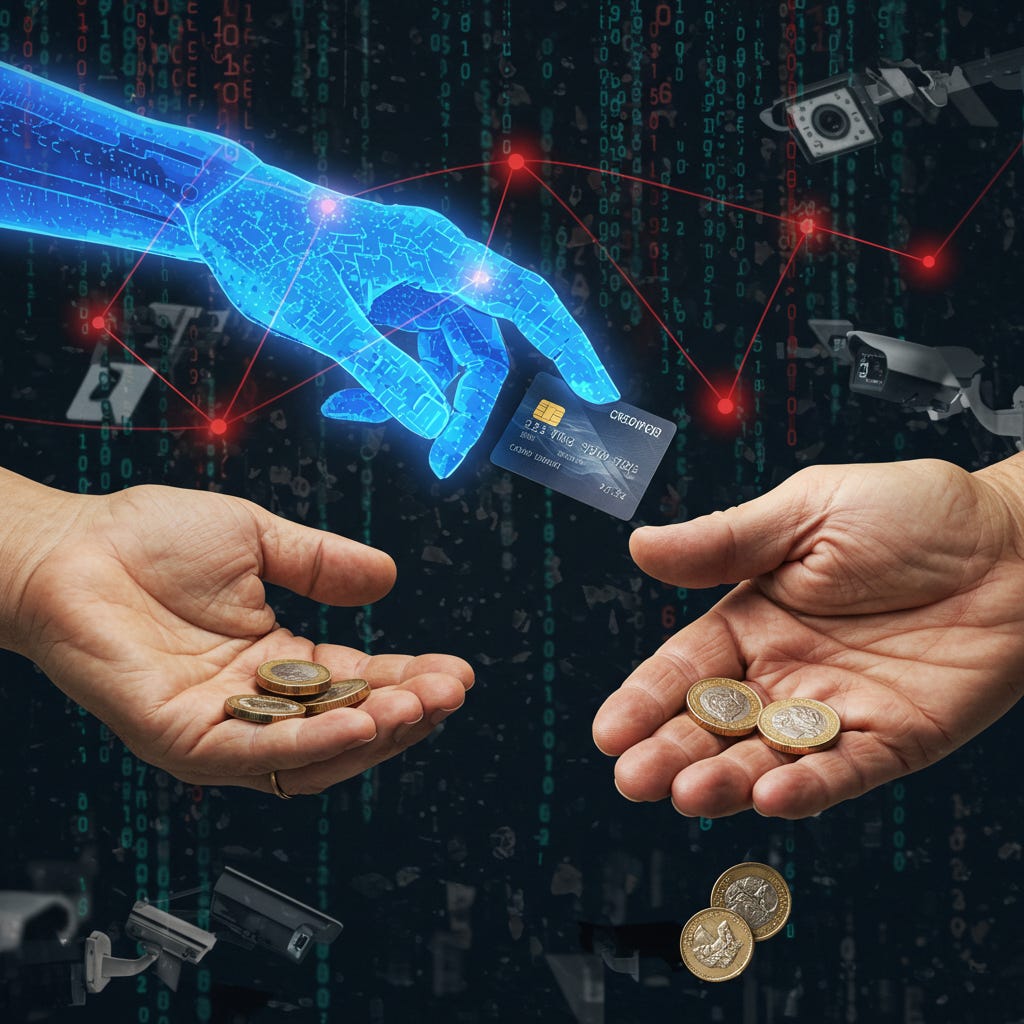#Bristol - The Human Cost of a Cashless Future.
Individuality, Connection, and the Growing Shadow of Surveillance.
That simple question, "cash or card?", feels a bit more serious lately. We're hearing more and more about cyber attacks hitting important services, and it makes you think twice about relying only on digital payments.
Think about it: big shops like Marks and Spencer and the Co-op have been targeted, and even banks like Barclays have had problems. These attacks didn't just stop card payments; in M&S's case, online orders were affected. It shows how a cyber problem can spread and really mess things up for us shoppers. The fact that the Co-op was targeted again soon after just shows these threats aren't going away.
Now, imagine if we couldn't even use cash. If shops on our high streets couldn't take notes and coins because of some big system failure, and cards were down because of hackers, loads of people wouldn't be able to buy the basics. That's why I always like to keep a bit of cash handy myself. You never know when the systems might go down, and it's good to know you can still pay for what you need.
We even saw a worrying example recently in Spain and Portugal. They had a massive power cut, and while they're still figuring out exactly what happened (a cyber attack is one thing they're looking at), the impact was huge. Trains stopped, phones weren't working properly, and people couldn't get cash from ATMs. It shows how easily things can go wrong in a world that relies so much on digital systems.
And for me, there's another reason I prefer cash. Spending it feels much more personal. When you hand over notes and coins, you're actually interacting with another human being, the person behind the till. It's a little moment of connection, a friendly exchange that you just don't get when you're tapping a card on a machine. There's something quite social about using cash. Thinking about it, that person behind the till, taking my cash, that's their job, their livelihood. It's what helps them keep a roof over their head and put food on the table for their family. I certainly don't want to be part of a system that could lead to more unemployment for so many people who rely on that income. Having said that, you won't catch me in a shop with a 'Cash Only' sign! Honestly, it might be the easy option for them, but if my perfectly good cash isn't welcome, then neither is my custom. Count me out!
Why Going Cashless Could Be Risky.
Moving to a completely cashless society has some real downsides, especially for those who are already struggling:
Leaving People Out: Not everyone has a bank account or the ID needed to get one. Older folks, people on low incomes, and those in rural areas might not have easy access to digital payments. Going cashless would shut them out of being able to buy things.
The Digital Divide: Not everyone is comfortable with technology or has easy access to it. Relying only on digital payments would make things even harder for those who aren't tech-savvy.
Everything Can Go Wrong: As we've seen with cyber attacks and power cuts, digital systems can fail. If everything is digital, a problem could stop everyone from being able to pay for anything.
Loss of Privacy: When you pay with card or phone, it leaves a record. Every purchase can be tracked, which means companies and even the government could know a lot about what you buy. Cash is much more private.
More Fees: Without cash, we might be forced to use payment methods that charge fees, which would hit those with less money the hardest.
Harder to Budget: Some people find it easier to keep track of their spending when they can see and feel physical money. Digital money can feel less real, making it easier to overspend.
What About Governments Tracking Our Spending?
The idea of any government keeping tabs on all our financial details is a bit worrying. When you think about a country like China, with its big surveillance systems, it becomes even more concerning. They could potentially use this information for more than just catching criminals or managing the economy:
Controlling People: Our spending habits could be linked to things like a "social credit" system. This could mean rewards for what they see as good behaviour and punishments for bad behaviour, maybe even affecting access to important things like travel or jobs. While the idea of a single score controlling everything is debated, they are definitely building the systems to watch and judge people's actions, including how they spend money.
Watching Dissent: If you spend money in a way the government doesn't like, or donate to certain groups, they could flag you as someone to watch.
Discrimination: They could build up detailed profiles of people based on their spending. This information could then be used to treat people differently, maybe limiting what they can buy or access.
Cyber Attacks and Leaks: All this personal financial data stored by the government would be a huge target for hackers, both from other countries and criminals. If there were a data breach, loads of people's sensitive information could be stolen.
No One Checking Them: It might be hard to know exactly how the government is using this data and to complain if something goes wrong.
Spreading Across Borders: As China becomes more powerful in the world, how they collect data could affect people and businesses in other countries too.
So, while paying with our phones or cards is often easier, the growing threat of cyber attacks and the risks of a completely digital financial world are clear. We need to think carefully about keeping cash as an option and making sure our data is protected. For me, having a bit of cash in my pocket just feels like a sensible backup, and it also allows for those nice, human interactions when I'm paying for things. And while I like having cash as an option, businesses that refuse card payments are definitely missing out on my business!
It's easy to feel like we're becoming just numbers in a system these days, isn't it?
Digital Everything: More and more, we use digital logins and IDs for everything. While it's often necessary, it can feel a bit impersonal.
Data Everywhere: What we buy online, where we go, it's all being tracked and put into big databases. Computers then analyse this to put us into categories and guess what we'll do next. Sometimes, this means we lose our individuality and become just statistics.
Social Credit (Again): The idea of scoring people based on their behaviour, including how they spend money, really makes you feel like you're being reduced to a number that decides what you can and can't do.
AI Taking Over: As artificial intelligence becomes more common, our interactions might become less human and more like transactions. It could feel like we're being processed rather than treated as individuals.
But it's not all doom and gloom:
Making Things Personal: Data can also be used to make things better for us, like suggesting things we might like or giving us information we need.
Easier and Faster: Digital systems often make things much quicker and more convenient than old-fashioned ways of doing things.
We're Still Human: Despite all the technology, people are still creative, connect with each other, and don't just accept being turned into numbers.
Whether we end up in a world where we're just numbers isn't set in stone. It depends on the choices we make as a society – the rules we put in place, what we value when we create new technology, and how we choose to interact with each other and with technology. The old TV show "The Prisoner," where people were known by numbers (“you are not a name, you are a number”), reminds us to be careful about protecting our individuality in this digital age. It's still popular because it explores this tension between being an individual and being part of a system.
The convenience of "cash or card?" takes on a much darker meaning when we think about cyber attacks and the possibility of a completely digital way of handling money. Recent attacks on big UK shops and banks show how easily things can go wrong. And the idea of not being able to use cash at all, along with things like the power cut in Spain and Portugal, paints a scary picture of what could happen if these systems fail. This is especially worrying for those who don't have bank accounts or aren't comfortable with technology, highlighting the dangers of a cashless society.
On top of that, the increasing amount of personal financial information being collected raises big questions about our freedom and privacy. The thought of governments like China tracking everything we spend could lead to them having more control over people, watching those who disagree with them, and even treating people differently based on their spending habits. This brings to mind, once again) the chilling words from "The Prisoner": "you are not a name, you are a number." Even though that show was made before our digital world, it really hits home with our worries about losing our individuality in a world driven by data.
While digital technology definitely has its advantages, the risk of things going wrong and the loss of privacy mean we need to be careful about rushing into a cashless future. Safeguarding access to diverse payment methods and having strong rules to protect our data are vital. We need to make sure that as technology advances, it doesn't come at the cost of our personal freedom and doesn't leave the most vulnerable people behind. The lasting message of "The Prisoner" reminds us how important it is to hold onto our individuality in an era where the temptation to categorise and count us is ever-present.




Brett Scott makes excellent cases for keeping cash on his Altered States of Monetary Consciousness Substack.
It's hardest trying to persuade the younger generations who are growing up with smartphones that we need to use cash or we'll lose it.